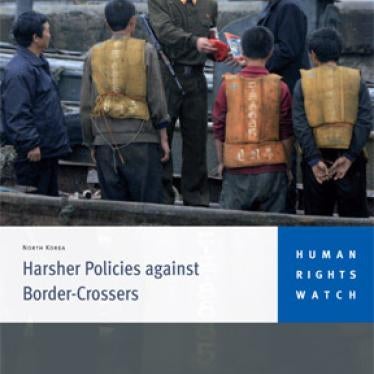(Seoul) - In an ominous hardening of policy, North Korea appears to be punishing its citizens with longer sentences in abusive prisons if they are caught crossing the border to China or have been forcibly repatriated by Beijing, Human Rights Watch said in a new briefing paper released today.
According to recent escapees from North Korea interviewed by Human Rights Watch, Pyongyang announced that it would send people who crossed the border, including first-time “offenders” and those crossing only to find food, to prison for up to five years. “North Koreans are crossing into China to avoid starvation since their government is either unwilling or unable to feed them,” said Sophie Richardson, deputy Asia director at Human Rights Watch. “Not only does the North Korean government fail to feed its population, but it also persecutes its citizens for simply trying to survive.”
Human Rights Watch recently interviewed 16 North Koreans who crossed the border to China between mid-July and early December 2006. Although the number of the interviewees was not large enough for Human Rights Watch to obtain comprehensive information on the conditions inside the country, the diversity in age, gender, hometown, social class and personal experience of those interviewed suggests that their testimonies provide a credibly objective picture. Most importantly, they provided consistent testimonies on harsher punishments for those recently repatriated. According to the North Korean interviewees, North Korean authorities as early as 2004 began warning citizens across the country that even first-time border-crossers would be sent to prison for terms that varied from one to five years.
The announcement reflects a reversal of North Korea’s policy since 2000, under which punishment imposed on border-crossers had been relatively lenient. Between 2000 and 2004, many border-crossers had been either released after questioning, or served at most a few months at labor re-education facilities, unless they were found to have had contact with missionaries or South Koreans. Under the new policy, the authorities warned that everyone would be sent to prison, regardless of the reason why they left or whom they met in China. According to the North Korean interviewees, the policy change occurred in the summer of 2004, soon after South Korea flew hundreds of North Korean refugees from Vietnam for resettlement in South Korea. North Korea called the South Korean action “kidnapping,” and angrily demanded the return of the refugees. When South Korea refused to do so, North Korea cut off all dialogue with South Korea for 10 months. Two of the interviewees specifically pointed to the Vietnam incident as the reason behind the change of the policy.
North Korean border-crossers who had been imprisoned described to Human Rights Watch the abuses they suffered, including strip searches, verbal abuse and threats, beatings, forced labor, little or no medical care, and severe shortages of food, often described as a “fistful of powdered cornstalk per meal.” As punishment for disobedience, former detainees said they were forced to hit their own heads against cell bars and to sit up and down repeatedly until they fainted. Such punishments were often inflicted for failing to sit still for hours on end, and collective punishments of entire groups of cellmates were common. Human Rights Watch urged the North Korean government to stop arresting people crossing the border, and to allow its citizens the freedom of movement inside and out of the country. North Korea is a party to the International Covenant on Civil and Political Rights, which guarantees everyone the freedom to leave any country, including their own. The government thus has a legally binding obligation to ensure its citizens can exercise this right, and not punish them for it.
“North Korea must stop punishing border-crossers who have committed no crime but have merely left their country without permission,” said Richardson. Human Rights Watch also called on China to stop categorically labeling North Korean border-crossers as illegal economic migrants and summarily repatriating them. The Chinese government should grant the United Nations High Commissioner for Refugees access to North Koreans in the border area to screen for refugee status.







